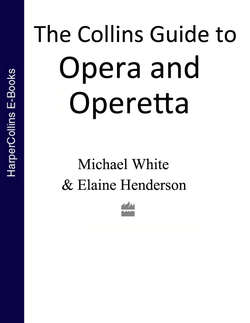Читать книгу The Collins Guide To Opera And Operetta - Michael White - Страница 17
ОглавлениеI Puritani
(The Puritans)
FORM: Opera in three acts; in Italian
COMPOSER: Vincenzo Bellini (1801–35)
LIBRETTO: Carlo Pepoli; after Ancelot and Saintine’s play, itself based on Sir Walter Scott’s novel
FIRST PERFORMANCE: Paris, 25 January 1835
Principal Characters
The Puritans
Lord Walton Bass
Sir George Walton, his brother Bass
Sir Richard Forth Baritone
Sir Bruno Robertson Tenor
Lord Arthur Talbot, a Cavalier Tenor
Henrietta of France, Charles I’s widow Mezzo-soprano
Elvira, Lord Walton’s daughter Soprano
Synopsis of the Plot
Setting: A fortress outside Plymouth during the English Civil War
ACT I Elvira has finally overcome her father’s objection to her marriage to the Cavalier, Arthur Talbot, leaving Richard Forth a disgruntled and rejected suitor. To Elvira’s joy, distant horns announce Arthur’s impending arrival and he sweeps in in great style, bringing gifts that include a superb white bridal veil for his betrothed. Lord Walton gives Arthur and Elvira a safe conduct pass, saying that he cannot attend the wedding because he must escort a female prisoner, a suspected spy, to London. The prisoner is brought in and Arthur recognises her as the widow of the executed Charles I. Arthur knows that, if anyone finds out who she is, she will be murdered, and he resolves to help her escape. Draping Elvira’s veil over Henrietta’s head, he smuggles her out of the fortress, intercepted only by Richard, who, seeing the woman is not Elvira, is glad to see Arthur go and hopes that he may now win Elvira’s love. On discovering her apparent desertion Elvira loses her reason.
ACT II Elvira’s madness is observed at length in the famous Mad Scene, but the act closes on George Walton and Richard Forth as they confirm their readiness to fight to the death for the Puritan cause and, if necessary, to kill Arthur Talbot.
ACT III Arthur has now delivered Henrietta into safe keeping and is a fugitive. Nevertheless he risks his life to return to Elvira who is so shocked that she seems, partially, to regain her senses. But her obviously fragile mental state deeply disturbs Arthur and he refuses to leave her, even when he hears his Puritan enemies approaching, although he knows that capture will mean death. But, just as he is about to be summarily executed, news arrives of Cromwell’s victory and the granting of a general amnesty. Elvira’s joy finally restores her to sanity, Arthur is a free man and the lovers are united.
Music and Background
Written for Paris, I Puritani is generally considered the most sophisticated – though perhaps among the less dramatic – of Bellini’s opera scores, with a finer grasp of orchestration (the composer’s undeniable weak point) than he showed elsewhere. There is a pervasive militarism in the music, with prominent brass and percussion, and marching rhythms that bear out Bellini’s own description of his work here as ‘robust’ and ‘severe’. But there is also brilliance in the vocal writing, which demands a strong quartet of principal singers and, especially, a tenor with good top notes.
Highlights
Elvira’s Act II ‘Qui la voce’ is one of the more affecting mad scenes in Italian opera; and the duet ‘Suoni la tromba’, also in Act II, is a famously stirring example of Bellini’s martial music.
Did You Know?
Bellini wrote no comedies. He always chose to place his characters in what he termed situazioni laceranti – heart-rending predicaments.
George Bernard Shaw disliked the opera intensely, saying that the music ‘has so little variety in its cloying rhythms that it vies for dullness with any Italian opera on the stage’.
Recommended Recording
Maria Callas, Giuseppe di Stefano, La Scala Milan/Tullio Serafin. EMI CDS7 47308-8. A 1955 recording in mono, but with Callas in superbly stylish form; not always beautiful but powerfully dramatic.
